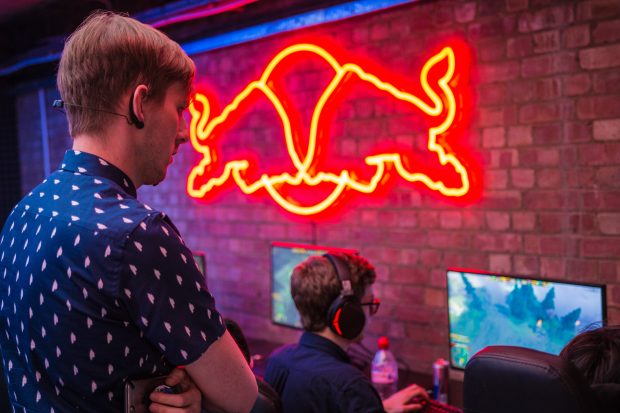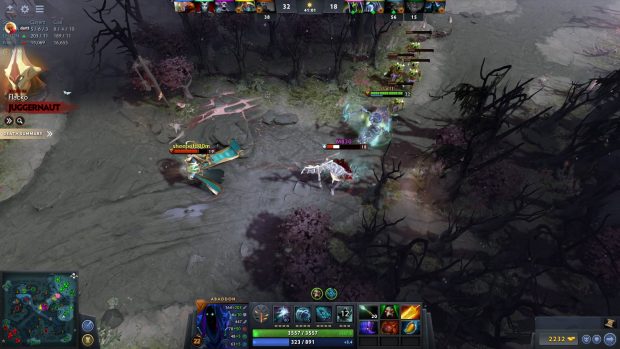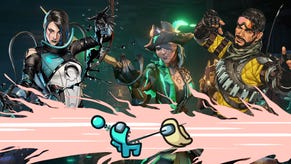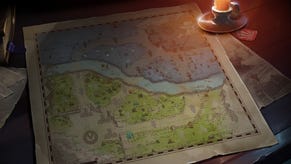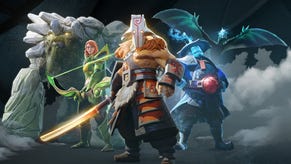What I learnt from Dota 2 pro Purge about the game and those who play it
A whole rude world
Kevin 'Purge' Godec is an ex-pro Dota 2 player turned analyst, commentator and coach, and I recently went to an event in London where me and a few other journos (*puts on Red Bull Esports voice*): "trained under Purge”.
We played a couple of games against people who were far better than us, then listened to a man with near comprehensive knowledge of a stupidly complicated game brutally highlight our every misstep in front of a large crowd of people.
I loved it, though not because of the valuable advice. I loved it because it felt like stepping back into a world that I thought I’d left behind, and realising that I’m eager to get back to exploring. I also hated it, because it brought me face to face with some of that world's unpleasant inhabitants in a way that I never have been before.
"I hate it when carries get greedy", says Purge. We're gathered round a wall-sized screen, watching a replay of events going awry on the Radiant team's safe lane. The person playing Morphling has just explained his reasons for kicking a less-experienced teammate out of 'his' lane, stating that the support Witch Doctor simply wasn't getting anything done. The Witch Doctor has a fraction of the Morphling's experience playing Dota, and it shows. Having bluntly been told to leave, the replay follows him as he wanders around the nearby jungle, unsure what to do.
It takes a couple of minutes for Purge to go over his problems with the Morphling's approach, though he's far friendlier about it than I would have been. He suggests that kicking a new player out of a lane, especially without any advice on what they should do instead, is likely to be more counter-productive than quickly showing them how they can help by bringing creeps from the jungle onto the lane. In response to the Morph's sullen reply about how he thought he'd go top, Purge points out that those kind of rotations are costly for a support - and in any case, it seems unlikely that the Witch Doctor would accomplish any more up there.
The Morphling knew that, really. Even though his decision to kick the Witch Doctor out of his lane (his exact phrasing, by the way) was based on a desire to win the game, a little bit of non-egoistic thought should have been all he needed to realise that it actually decreased their chances.
Based on his expression and his attitude, I don't think he ever accepted that.
So, that was one dude who obviously behaved more abrasively than the norm. I wouldn't be telling you about him, though, if it wasn't for the way that egoistic thinking seemed to be holding back most of the people at the training workshop. Not necessarily in the sense of bossing people around (though more on that later), but in the sense that they struggled to accept their mistakes as mistakes.
All too often, when Purge highlighted something that someone had done wrong, that player would pipe up from the crowd and try to justify it. 'No,' they'd assert, often with an aggrieved undertone, 'I was right because X.' Sometimes, that X involved pointing to mistakes that their teammates had made. On one level that makes sense to me - when Purge turned his gaze towards my fumbling Clockwork plays, my first instinct would be to defend myself. My second instinct, though, was to suppress that first one and avoid embarrassment. 'Yeah, Mr.Purge, I know you've spent countless hours both playing the game and as a professional analyst, coach and commentator: but have you considered that if my team had been positioned better, I'd have been fine?'
Not every example was as egregious as that, and some could be fairly interpreted as the offending player's attempts to explore what was off about their decision making. Nevertheless, I was taken aback by just how often people's outbursts didn't strike me as constructive. They were accusing Purge of having missed something, and it's telling that on all but one occasion the coach would wind up repeating what he'd just explained. I got a chance to speak to Purge after the training session, and ended up throwing away the questions I'd prepared so I could ask what he thought about people's behaviour. Did he see the same recurring problems with their mindsets that I did?
Sort of. He chalked some less than ideal approaches to learning down to "just typical human stuff, like stubbornness", though his responses were geared towards learning Dota in general rather than at the workshop. "I do the same thing, I'm like ‘I don’t wanna do the pro build because maybe it’s not as good as the build I theorycraft’... people should just use the watch tab and copy builds more. I don’t know why they don’t do that." He appreciates that some people enjoy the game best by figuring stuff out for themselves, "but if someone genuinely wants to improve and they’re frustrated - why don’t they just watch the good players?"
"But I totally understand why you don’t see that, I do the same thing myself sometimes. I might get stressed out about an issue, and not take that moment to be like ‘how can I solve this problem...OH, I can just apologise!’ It’s like when you give advice about girls to somebody else it’s really easy, but when you’re trying to do girl things you’re just flustered and you can’t look at the obvious solution. It’s the same thing kind of, you don’t want to overlook the obvious answer."
I've reread that quote a few times now, and it gets more interesting the longer I look at it. It's interesting that Purge equates stubbornness problems with problems with aggression, and that he's so forgiving of players that lose their cool - it came across more strongly later on in our chat, but he was keen to stress how difficult keeping your behaviour in check can be. It's interesting that he reckons he sometimes behaves in a way that warrants an apology, but doesn't. It's very interesting that his mind leapt to the girl advice comparison.
Nonetheless, during the workshop I kept going back to the same thought. Are the norms simply different among competitive Dota players? Maybe that sounds obvious, but I wasn't expecting the attitudes that are so common in online games to translate so directly to a physical environment. I'm sure some of the people in that room were the types that usually direct intolerable toxicity at teammates who make mistakes. Perhaps I shouldn't be surprised that when the barrier of anonymity that often makes abuse seem more acceptable to abusers was temporarily removed, a good chunk of that toxicity remained.
Purge didn't see it the same way. "There was maybe one guy today who was maybe being a little aggressive, and frustrated", he acknowledged, though in his eyes there were mitigating factors. "Generally the skill level today was [imbalanced], and there were a lot of stomps so I can understand why people were…" at that he trailed off, changed tack and pointed to people's unfamiliarity with the PCs as another cause of conflict. He saw people not realise they weren't pressing their push-to-talk buttons, get frustrated at their teammates apparently ignoring them, then angrily type what they wanted to say because "they’re just pissed at that point". He wasn't wrong - I saw that happen too - but I reckon it tells a smaller part of the story for me than it does for Purge.
Losing a game of Dota is sucky. It's often drawn out and miserable, where attempts at fixing the problem only end up cementing the other team's lead. Losing because of your teammate's errors, especially the ones that seem dumb, is even worse. In ranked games, there's the perpetual threat of dropping MMR, a number (or a rank, nowadays) that acts as a badge of respect in a way that I'm only just realising the extent of. In the workshop, there was the way people didn't want to look bad in front of Purge, even though the teams that lost wound up getting 90% of the feedback. In a sense, the victors were robbing themselves of advice they'd paid to receive.
It's an environment that can both bring the worst people in and bring out the worst in people, but none of that is a good excuse for behaving like a dick. Before we started one game, someone on my team said, tongue in cheek, 'I've got to remember not to scream and shout at people'. Playing with him didn't turn out to be nearly as bad as past experiences I've had with being bossed around, but our approaches to directing less experienced teammates were still far apart. There's a world between "Razor, buy back, now!" and "Razor, you might consider buying back."
Again, Purge's response would be one that I agree with up to a point. He described someone that would make me reach for expletives as "a little riled up" - "but in intense moments, it’s hard not to be emotional. I have the same problem. If something bad happens I’ll always be like ‘hey man, you shouldn’t have done that’ but that’s not constructive, that’s just gonna depress people. It’s better to ignore that and just look for ‘we should do X thing. This will help us get back in the game.' But you know, it’s about being a better person, learning your faults and fixing those problems. It’s hard to do that in Dota while you’re playing in a stressful moment."
It's true, the heat of the moment can make toasty arseholes of us all. Years ago, I used to play Dota as part of a semi-competitive team (we entered some tournaments! We lost those tournaments, hard), there came a point when we decided to make some communication rules. The one that seemed most important was that we'd never say 'Why did you do that?', because that question almost invariably translates to 'how could you be so utterly thick as to think that was a good idea?'. Even though we were all lovely, it still fell necessary to make those rules.
So yes, Purge is absolutely right about it being difficult to become a better person in the middle of a game of Dota. Thing is though, I suspect that figuring out how to communicate effectively and politely in a competitive environment can be a force that encourages positive change, both in life and in a game. I also suspect that years of being exposed to childish and aggressive players have lowered Purge's standards of acceptable behaviour.
With all that said, I can't dismiss the possibility that the worst offenders and offences stuck in my head in a way that made them seem more representative than they were. It could have been that I happened to catch the worst of it, that one or two particularly insidious individuals left me with a poorer impression of other people than I'd normally have. It would be remiss of me, too, to not mention the friendly chat I had with some of the players about why we all loved Dota.
And I do love Dota, as I started by saying. I haven't played regularly for a while, and I'd forgotten what an intricate, beautiful and constantly evolving tapestry the game can be. My image of that tapestry had dimmed with time, but the training workshop drew over some of those faded lines. There's a delicious satisfaction to moving towards mastery over systems layered on systems that are too complicated to be truly mastered, aside from by a select few people that practically dedicate their lives to the task. 'A good play' in Dota can involve a combination of reflexes, knowledge, teamwork and strategy that I'd argue is unparalleled in any other game.
I've played at least one match in most of my evenings since the workshop. While I once considered myself pretty good, since coming back I've hindered my team far more often than I've helped. I knew that would be the case, and asked Purge if he had any advice for anyone who wanted to get back into the game after a long break. He told me to "be prepared to lose", to "retake a gander at builds", and "maybe try to find more casual atmospheres" to play in. The most important thing? "To play with friends, so you have fun and the hardships are less annoying."
I'm just glad I've got friends to play with.




